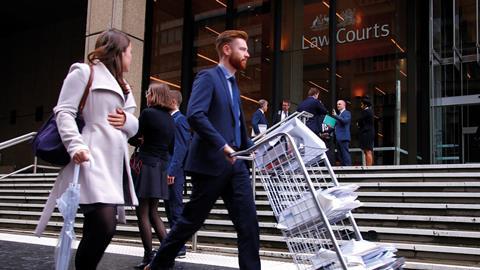As MPs set out a bold vision for open justice incorporating AI transcription and court documents available via a digital portal, Sir Bob Neill declares that such access is ‘our democratic right’
A bold blueprint to address the ‘critical gap’ in court reporting and the loss of public understanding of how justice is dispensed was set out this week by the House of Commons justice committee.
‘Too often, significant patience and tenacity are required to access court proceedings that it is our democratic right to witness,’ committee chair Sir Bob Neill MP said.
Some of the recommendations could be implemented quickly.
Every court, for instance, should publish an email address on its website to enable the media and public to request access to remote hearings.
HM Courts & Tribunals Service should provide regional communication and information officers whom journalists and the public can contact with access enquiries or to complain.
However, Neill said, if open justice is to be improved in the long term, ‘it will take place in the digital sphere and the court system must put in place the framework to facilitate that’.
The Ministry of Justice should consider expanding its proposed digital portal for court and tribunal lists to include case outcomes, reporting restrictions and court documents, modelled on the US-based Public Access to Court Electronic Records.
As the committee notes, court documents are rarely provided in advance and are often released only after a formal application to the court is made, even when the rules provide automatic access. When applications are successful, there is no system in place to provide the documents to journalists.
Transcription powered by artificial intelligence should be piloted to see whether it can reduce the cost of producing court transcripts. Existing transcription contracts should be reviewed to make records more accessible.
APPEAL, a charity dedicated to fighting miscarriages of justice, told the inquiry a transcript for a client’s trial would have cost £10,000. The trial lasted over 60 hours. The hourly rate is £157.74. The Bureau of Investigative Journalism said one particular service charges between £216 and £360 an hour for civil court transcription.
'The judgments of courts are the product of a publicly funded justice system and the public, the media and the legal sector should not have to pay significant sums'
House of Commons justice committee
The MoJ can look to Australia where, APPEAL points out, many courts, including the Federal Court of Australia, use automated speech-to-text technology.
The committee welcomed the MoJ’s recent work to make court judgments more accessible. The National Archives’ Find Case Law service, which presents judgments formatted to ease analysis by computer, went live earlier this year.
However, the committee says the service should represent the ‘first step’ in improving the public’s access to judgments. HMCTS should reform the way judgments are collected, stored and published so that there is less reliance on commercial legal publishers. ‘The judgments of courts are the product of a publicly funded justice system and the public, the media and the legal sector should not have to pay significant sums,’ the committee says.
The report covers several other important areas, including the controversial Single Justice Procedure (which the committee says should be reviewed) and the framework for observing remote proceedings.
Dr Natalie Byrom, director of research at the Legal Education Foundation, told the inquiry that responsibility for open justice ‘falls awkwardly between the judiciary and the MoJ’.
In 2020, a senior data governance panel was set up to advise the lord chancellor and lord chief justice on ‘novel or contentious’ applications to access and use data held by the courts. The committee recommends the panel be formalised, and its powers and remit defined and published. The HMCTS media working group, which was set up in 2018 and produced media guidance for court staff, should be empowered to make recommendations to the panel. A separate court information user group should be established to represent the interests of organisations outside the media, such as legal bloggers, who could also make recommendations.
Then there is the family court, described by the committee as poorly understood, largely due to restrictions that limit what can be reported.
Sir Andrew McFarlane, president of the Family Division, has already embarked on work to increase transparency. His Transparency Review recommended that judges publish anonymised versions of at least 10% of their judgments every year. The committee wants HMCTS to ensure sufficient resources are allocated to a new anonymisation unit to help make that happen.
The MoJ said it will carefully consider the committee’s recommendations and respond in due course.
The Federal Court of Australia is one of many courts that uses automated speech-to-text technology





































2 Readers' comments